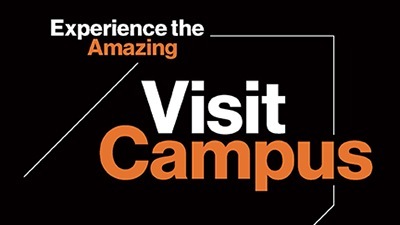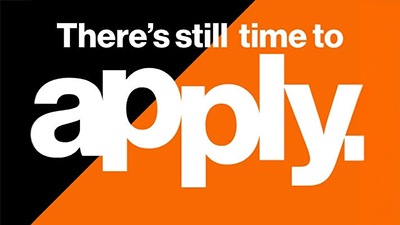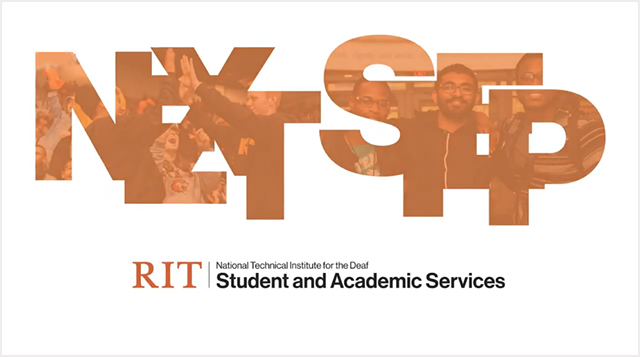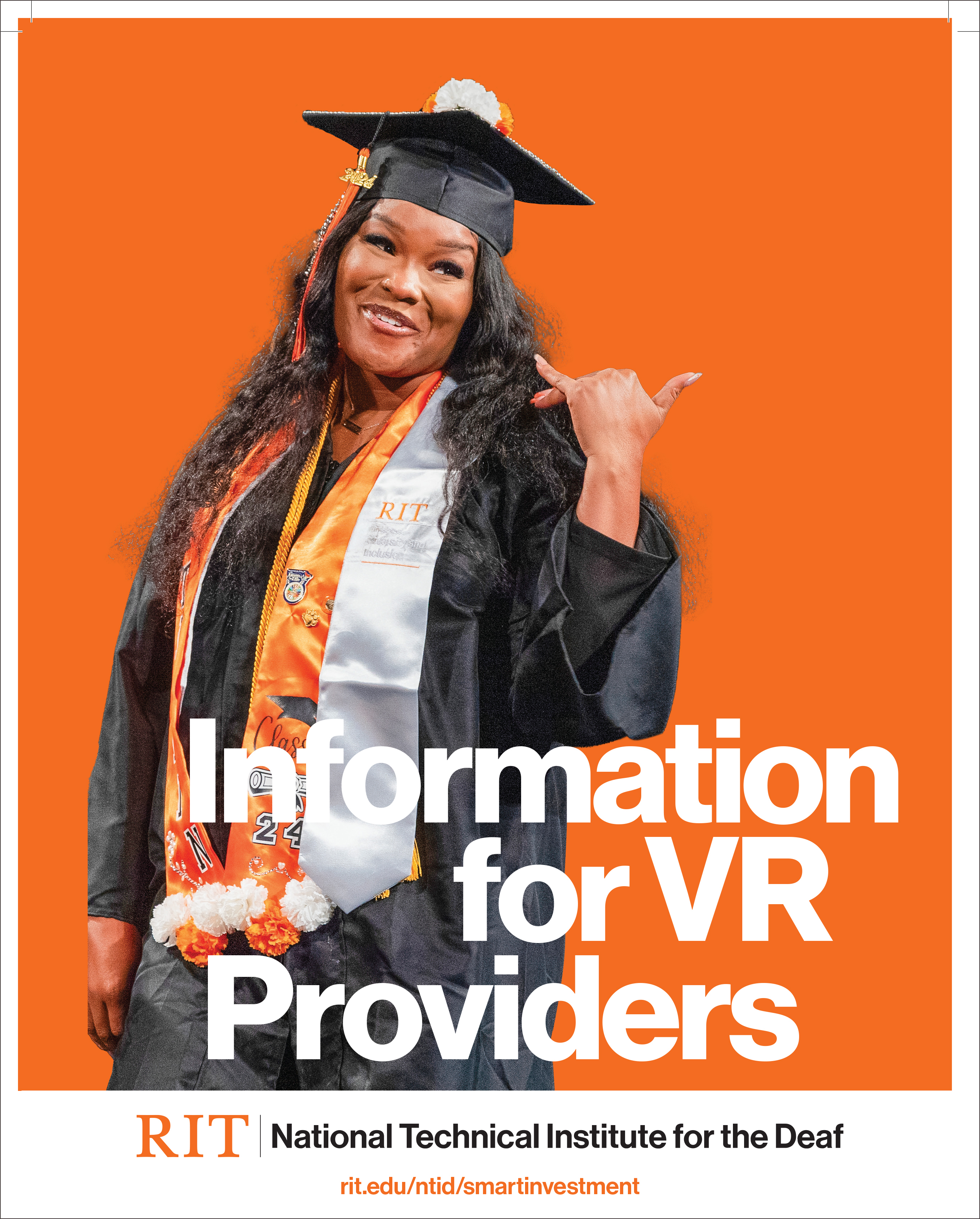Vocational Rehabilitation
- RIT/
- National Technical Institute for the Deaf/
- Admissions & Aid/
- Tuition & Financial Aid/
- Vocational Rehabilitation
Overview
Vocational Rehabilitation (VR) provides services to individuals who are deaf or hard of hearing or to those who have disabilities and who need help to qualify for or to find a job. VR may assist with vocational training or college. VR services may include financial assistance, employment planning, counseling, transportation, and job placement assistance. A VR counselor, who determines eligibility for services, is assigned to each individual requesting assistance. States have various names for VR, and services vary depending on need and the state in which a student lives.
If you have questions about VR related to RIT/NTID, please contact the NTID Student Financial Services office.
VR Resources for:
Frequently Asked Questions about Vocational Rehabilitation Services
NTID Financial Information Guide (Domestic)
NTID Financial Information Guide (International)
Check out NTID by the Numbers for a glimpse of what NTID looks like today.
Frequently Asked Questions
A Resource for Parents of Deaf and Hard-of-Hearing Students
As the parent of a college-bound student with hearing loss, you might not be aware that your state’s Vocational Rehabilitation office is an important resource available to you and your student to help you plan and finance a college education. VR offices exist in every state, and VR counselors work with high schools, junior colleges and universities across the country to help students with disabilities get the education they need for career success. Below, you'll find information that can help you work with VR to assist in funding your child’s education.
Vocational Rehabilitation is a federal- and state-funded program that provides financial and other types of support for employment- and education-related services and training to assist individuals with disabilities to qualify for, find or keep a job. The services available through VR for college students with hearing loss are designed specifically to meet the needs of the individual student.
To be eligible for services through VR, your student must meet the following federally mandated guidelines:
- Your student must have a documented physical, mental, emotional or learning disability that has a significant impact on your student’s ability to get or keep a job.
- Your student must require VR services to find, keep and succeed in a job.
Meeting with a VR counselor in your area can help you determine if your student is eligible.
Your student should contact a guidance counselor, teacher, principal or other school representative who can provide an application and make a referral. You also can contact your area’s VR office directly to get an application and set up an interview with a VR counselor.
Based on your student's application and interview, the assigned VR counselor will decide whether or not your student qualifies for services.
Services vary depending on need and the state in which your student lives. Each state agency has its own eligibility criteria, application process and methods for deciding the level of support it will provide. If your student is eligible, the VR counselor will work with your student to develop an Individualized Plan for Employment (IPE). The IPE has three basic parts: the individual’s job goals, the services needed to be successful in those job goals and the process for review of progress toward goal achievement. This IPE is based on your student’s abilities, strengths, priorities, concerns, interests and resources.
Students should contact VR during their junior year of high school or earlier to allow themselves sufficient time to work with a VR counselor to determine employment goals prior to entering college.
Your participation in the VR process is very important, especially if your student is underage. Go to the first meeting, then stay in touch to make sure VR’s planning activities are consistent with the plans you and your student are making with the college your student plans to attend.
A few questions you can ask VR to get your discussion underway include:
- How does my state decide how much funding my student will receive?
- How long will it take to determine if my student is eligible?
- If I claim my student on my taxes, does that affect VR support?
- If my student receives SSI benefits, how will this benefit affect VR funding?
- Does VR support cover the cost of career-related summer programs for high school students?
VR probably will not cover all of your student’s expenses related to college in the IPE, so it's important that you also contact the financial aid office at the college or university your student will be attending to find out about other sources of financial support.
No. According to the Rehabilitation Act, federal regulations state clearly that state agencies cannot establish policies that “effectively prohibit the provision of out-of-state services.” However, a state agency "may establish a preference for in-state services," as long as there are provisions to ensure that your student is not denied a necessary service. If the out-of-state program costs more than an in-state service, and it is determined that either service would meet your student’s rehabilitation needs, the VR system is not responsible for costs in excess of the cost of the in-state service. Your student can still choose an out-of-state service, and the VR system would be responsible for the costs of the out-of-state program, up to the cost of the in-state program.
If there is no program within the state that will enable your student to meet his/her employment goal, the state must have a process to fully fund the out-of-state program (subject to any financial need criteria the state may have established). Generally, VR offices have a written policy covering this situation.
If you disagree, you have the right to appeal. To initiate an appeal, you or your student should write to the director of your state VR office and identify the reason(s) for the appeal and the action you wish the office to take. In addition, each state has a Client Assistance Program, which can provide you with advice and assistance in resolving issues and concerns. In most cases, an individual issue or concern is addressed without having to conduct a formal appeal hearing. Get more information on appealing a VR decision.
Contact the Social Security Administration District Office to get specific information about the impact of VR services on your student’s SSI benefits.
No, VR support must be assessed each semester. Your student is expected to maintain good academic standing and is required to maintain contact with his/her VR counselor and to keep the counselor up to date with all transcripts, changes in courses or curricula, financial status or problems encountered.
Yes, you need to complete a FAFSA (Free Application for Federal Student Aid) in the early spring of your student’s last year of high school and each year while your student is attending college.
VR may support your student to participate in activities related to his/her transition planning from high school to postsecondary education, such as the Explore Your Future program for deaf and hard-of-hearing students at RIT. By participating in transition programs like EYF, your student begins the process to prepare for life after high school. Through self-assessment and hands-on activities, your student will learn more about how to match his/her interests, personality and skills to a career and career-education options. To find out if your VR office will support transition planning programs like EYF for your student, contact your VR counselor.
Online transition planning programs also are available for your student to help him/her learn about his/her career interests and goals.
Contact the VR office closest to your home. VR programs are known by different names in different states, but you can find information in your local telephone directory under "State Government."
VR Contact Information
585-475-2582 (v)
585-286-4525 (vp)
dchsfa@rit.edu
Office of Financial Aid & Scholarships Enrollment Management
585-475-2186
ritaid@rit.edu
Office of Financial Aid & Scholarships Enrollment Management
585-475-2186
ritaid@rit.edu
585-475-6863
blptso@rit.edu
RIT Student Financial Services
585-475-6186 (v/vrs)











